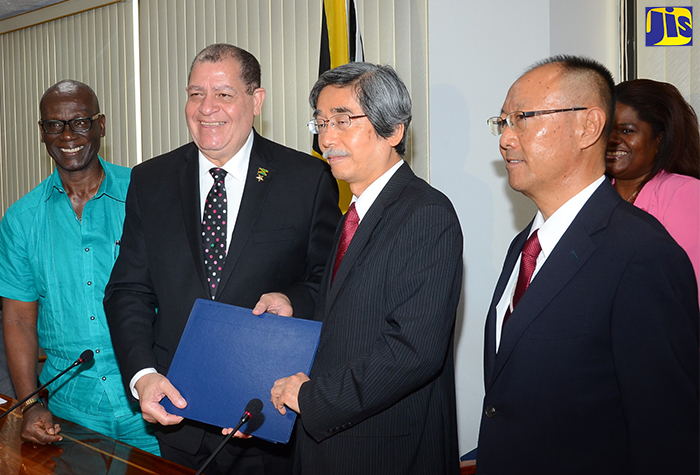Japan Provides $1.6-Billion Grant to Boost Disaster Communication
By: , April 7, 2017The Key Point:
The Facts
- The provision, to be disbursed to the Government of Jamaica over four years, will be used to purchase and procure equipment and other inputs to implement the ‘Improvement of Emergency Communication System Project’.
- Finance and the Public Service Minister, Hon. Audley Shaw, and Japan’s Ambassador to Jamaica, His Excellency Masanori Nakano, signed the grant agreement at the Ministry’s National Heroes Circle offices in Kingston on Thursday, April 6.
The Full Story
Jamaica’s communication capability before, during and after disasters is being significantly boosted through a J$1.6-billion (¥1.39-billion/US$12.58-million) grant from the Government of Japan.
The provision, to be disbursed to the Government of Jamaica over four years, will be used to purchase and procure equipment and other inputs to implement the ‘Improvement of Emergency Communication System Project’.
It was facilitated through negotiations between the Government and the Japan International Cooperation Agency (JICA).
To be executed by the Office of Disaster Preparedness and Emergency Management (ODPEM), the project will provide the platform for communications among critical Government agencies, first responders, major stakeholders, auxiliary services and community volunteers.
Finance and the Public Service Minister, Hon. Audley Shaw, and Japan’s Ambassador to Jamaica, His Excellency Masanori Nakano, signed the grant agreement at the Ministry’s National Heroes Circle offices in Kingston on Thursday, April 6.
The proceedings also included the signing of the resulting Exchange of Notes and Record of Discussions.
Local Government and Community Development Minister, Hon. Desmond McKenzie, who has portfolio responsibility for ODPEM, and JICA Resident Representative in Jamaica, Kenji Tobita, were among the participants.
Mr. Shaw, in welcoming the grant support, said the project will significantly strengthen ODPEM’s preparedness to respond in the event of natural disasters.
This, he noted, through mechanisms to improve the timeliness of response and recovery at the national, parish and community levels.
The project’s major components, Mr Shaw outlined, include integration of the National Works Agency’s (NWA’s) microwave network for data communication; installation of communication systems that will serve an additional 24 repeater locations, up from the nine stations ODPEM currently operates; and early-warning sirens at 15 locations in three communities.
Additionally, the project will facilitate the provision of radio equipment, transmission and reception devices to key response entities, and placement at two of the island’s key offshore locations – Morant and Pedro Cays.
“The project is critical for the improvement of public security and safety; fire rescue, search and rescue (marine and land) and medical emergencies; evacuation planning, communication and mobilisation; the Local Emergency Operations Centre; and for the improvement of communities and areas prone to flooding, storm surges, landslides and other hazards,” the Minister underscored.
Mr. Shaw pointed out that the Government continues to “proactively seek opportunities” to promote sustainable economic development and ensure citizen security and safety.
He said steps, to this end, have been taken to mitigate the potential devastating impact to life and property from occurrences such as hurricanes and storms.
“This objective is in keeping with the Vision 2030 National Development Plan under which Hazard Risk Reduction and Adaptation to Climate Change is a Priority National Outcome with specific focus on strengthening the disaster response capacity of Jamaica,” the Minister added.
Mr. Shaw said the administration anticipates future partnerships with the Government of Japan “in building our capacity in disaster preparedness and responsiveness”.
In his remarks, Ambassador Nakano said he is confident that the project will significantly enhance Jamaica’s infrastructural capacity and resilience in coping with natural disasters.
This, he pointed out, through the establishment of an islandwide communication response mechanism “that is expected to be highly effective before, during and after the (occurrence) of a natural disaster”.
For his part, Mr. McKenzie said Thursday’s proceedings marked another major step “that will only advance our capabilities to respond in a more meaningful way to threats of disasters”.


